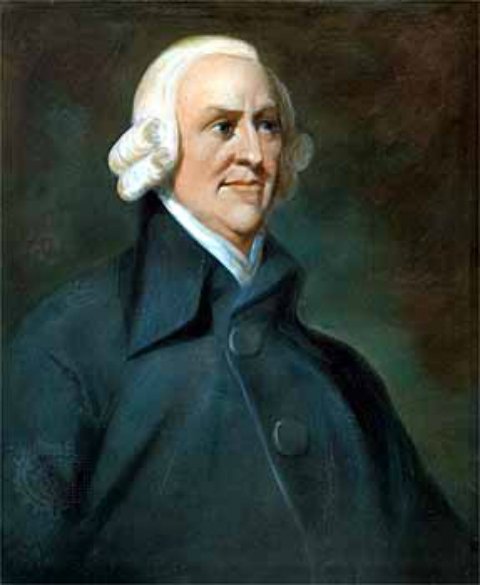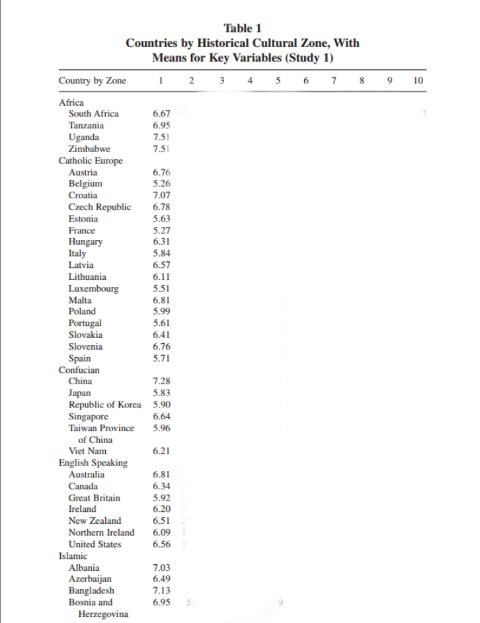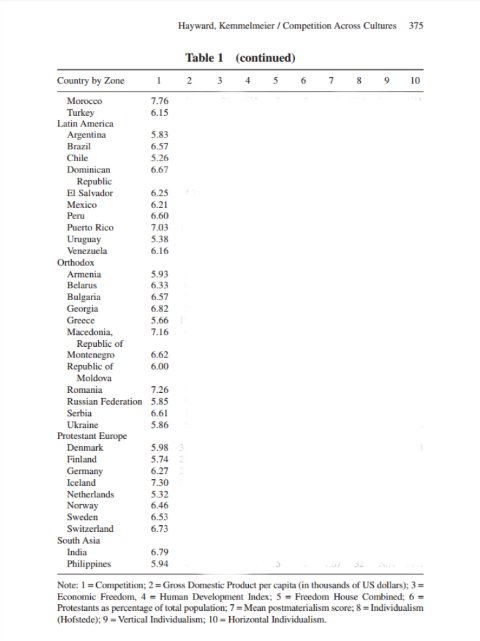Competition And Self Interest - The Ultimate Group Strategy
The 18th Century economist Adam Smith espoused the notion that: competition is a positive force in the world. Such that it allows people to express their natural tendency to strive toward improving of their own lot, with competition resulting in a better society as whole.
However in modern times, from the school playground to the corporate boardroom, we see a sneering and denigrating attitude displayed towards self-interest and by de facto competition.
At this point, some observers may completely disagree with me, and point out that capitalism is geared towards competition. It rewards and celebrates it in equal measure; the more competitive you are. the more sumptuous your feast at the capitalist table.
However I say that perhaps at one point the idea of rewarding competition was an ideal that was upheld. This is no longer the case, the idea of true competition has become toxic within our current capitalist paradigm, and this needs to change, in fact, this is changing.
The 17th Century philosopher Thomas Hobbes believed that societal control was the only answer to the evils of self-interest and competition. He believed that competition appealed to the
worst in people, ultimately destroying the most valuable parts of the human experience.
I would say that the overall world view at this time in history, is more in line with Hobbes's negative views towards self-interest and competition.
The thought intrigued me enough to see if any studies have been carried out, gauging people's attitudes towards competition as a social tool; and indeed there have.
More on that shortly, for now, let's talk about what I see as...
The Killing Of Competition
I went to school in the 1970s, 80s and some of the 90s in London, England, and as much as a child can fully appreciate social attitudes, I have seen big changes.
In my mind competition, and the celebrating of the individual was supported far more then than it is now. At some point in the last 30 or so years, self-interest and competitiveness have been joined together in an unholy matrimony by a vitriolic press, and a willing public.
In 1979 Margaret Thatcher became the Prime Minister of Great Britain and Northern Ireland, Thatcher was a big believer in Adam Smith, and often espoused his views on individualism and the state. She famously said "...there is no such thing as society", when talking of the responsibility of the individual over a nebulous concept such as society.
This statement, and subsequent political actions, saw the Conservative party, dubbed by the press as the; nasty party.
This soundbite induced headline personalised competition and self-interest like never before. Whilst Thatcher may have argued that she neither praised nor denigrated competitive self-interest, merely recognised it. Ironically from her standpoint; that statement, along with what many saw as unfeeling policies, played some part in the killing of competition.
The Worst PR Campaign For Competition And Self Interest - Global Corporations
The 1980s also brought with it the revamped notion of corporatism, which has its roots in 19th century Catholicism, and originally had nothing to do with business interests.
The original notion of corporatism was that the society and economy of a country should be organized into major interest groups (sometimes called corporations) and representatives of those interest groups settle any problems through negotiation and joint agreement.
In contrast to a market economy which operates through competition, a corporate economic works through collective bargaining. The American president Lyndon Johnson had a favorite phrase that reflected the spirit of corporatism. He would gather the parties to some dispute and say,
"Let us reason together."
However with the new corporatism, came new kinds of corruption. Quite aside of political manipulation, a new kind of collusion was to emerge. Secret monopolies were forged between large rivals, to keep out the plethora of smaller ones. Better the devil you know...
Time and time again we have seen corporations involved in price fixing, be it libor rates by banks or fuel surcharges by airlines. These actions and ones like them, are of course, anti-competition, and indeed we have anti-competition laws in place; and therein lies the problem.
Some may say it's semantics, however words are the tools we use to make sense of the world outside of our own heads. We use them to communicate meaning, and therefore, if we use words that convey a certain meaning, when we intend to say another thing altogether; that's when we're really in trouble.
So laws that have been made to stop anti-competitive behaviour, have been shortened and simplified to anti-competition laws. As if competition itself is the enemy, however if we rationalise further, it is self-interest that is seen as the problem. Competition is fine, however it's those nasty corporations out for themselves that is the problem.
Aha! Now we're getting closer to the truth of our societal psychosis, deeper and deeper down the rabbit hole we go...
Capitalism - Merging Self And Society
img source
In Western Capitalist societies, we are taught from an early age about the value of cooperation; via our parents, and even the TV. (I can't think of that Big Yellow Bird, without hearing the word cooperation, spoken by many young voices.)
Then in schools we wear the same uniform of our peers, as a way of balancing out the peaks and troughs of individualism. After we leave our schools to go on to higher education or paid employment, we attain a more subtle uniform of conformity to the group.
At a guess, the words; team player, are probably the most overused words in the history of job applications and CVs.
This path to groupdom, is a tried and tested one, it matters not whether it is the conformity of capitalism, communism or religion. Whichever paradigm you are in, the result is the same, the eradication of self, for the ultimate benefit of the group, the very antithesis of self-interest.
However this one world view that the group is the be-all and end-all of our success, is to miss a crucial point.
Without the individual, there is no group.
Group Happiness
In religion we see a similar anti-individual message being profigated, we are told that the pursuits of the flesh, from which derive competition and self-interest, are somehow debase, not worthy of our true attention. Instead we are to take ourselves selflessly into the world, and think of our fellow humans and most of all God, above our own wretched lives.
Whether we are being told to be at one with the universe, be humble and to turn away from pride, or be poor and enter heaven easily; the underlying message is essentially the same. The enemy of the group, is the individual seeking to gain competitive advantages, over other individuals in the collective.
The rhetoric of holy texts and philosophies, just like those of communism and capitalism, have blurred the difference between self-interest, and selfishness.
These two things have come to be one of the same thing in the minds of many humans, living in many different societies across the globe, and just like non-competitive sports, no good can come of this way of thinking.
All religions are the same: religion is basically guilt, with different holidays.
~ Cathy Ladman
Below are the results of a global study on people's attitude to self-interest and competition. Citizens of 81 different countries over 2 years were asked to record their views on competition.
They were asked to rate their answers from 1, (Competition is good. It stimulates people to work hard and develop new ideas); to 10 (Competition is bad. It brings out the worst in people).
The results have been simplified, with much of the data removed, however it is interesting to note, that the most group-orientated countries, who have at present or in the past, embraced communism or religious uniformity. Are the very same countries that have the highest negative attitudes towards self-interest and competition.
Although we can also see that it is not just the communist and ultra-religious countries with this attitude. It is entirely pervasive, just to different degrees.
Three Cheers For Self-Interest!
The conclusions we can draw, are that self-interest and selfishness are not one of the same thing. However sometimes they will be perceived that way, either because of social background noise, or because the defining lines are not always clear.
With this blurring comes also the misunderstanding of competition, which in itself has been used as a tool in nature to advance every species on the planet.
We are told that we should not "hate the player, but hate the game", however it is neither, as long as rules that ultimately are for the betterment of the group, are adhered to, we should embrace the players and the game.
Moving into this new technological, and economical paradigm that we see stretching out in front of us. We should look to encourage self-interest and competition at every level, because time and time again throughout history, we have seen rampant self-interest, mixed with healthy competition, turn into group interest.
So three cheers for competitive self-interest!
Sources:
How Competition Is Viewed Across Cultures - A Test of Four Theories R. David Hayward Markus Kemmelmeier - University of Nevada
Corporatism Lyndon B. Johnson source
Cryptogee







I believe it was once said that even altruistic acts are done in one's own self-interest. The ability to be of use to others is dependent on the efforts put toward bettering the self. The downfall of society, No. But is self-interest the driving force of life? Maybe...
Thanks @cryptogee for the well thought out piece, it really made me reflect.
Kind Regards,
@blockcodes
I think so.
Think about this for a second: what is self-disinterest? Does such a thing even exist? Can our minds ever not be interested in what we're feeling/ thinking, in any moment?
Ever try to meditate? That's a good way to find out how self-interested we really are - thoughts starting with "I", left, right, and center. Even the "altruistic" thoughts towards others has a strong tie to this "I-thought" - "how would I feel if this great thing were to happen to my love?", we ask ourselves out of the brief silence of the mind. The "selfless care" for that other person may appear very pronounced in the mind and senses at the ordinary level of consciousness, but we may have to dig much deeper (into the unconscious) to find the very subtle selfishness hidden in what we shallowly sense to be selfless.
We want them to feel _____. We want _____ to happen to them/ for them. We want, want, want. Desire, desire, desire. I, I, I. We can't just let things be and allow things to happen as chance would have it.
The self (ego) wants things to be a certain way - it's all about securing future peace and joy. Whether we desire to secure more peace and joy for ourselves or for all of humanity, it's still selfish because it's still a want that appeals to this "I", and appealing to the self means experiencing a joy response - the two terms are synonymous (therefore an act of self-interest).
Why should the world care what this "I" thinks? Is it partial to the opinion and desires of this oh-so-important-self that I am? Hell no! Yet, as long as a "me" exists, we will push to have our "ideal worlds" manifest into reality, even if that means stepping on the heads of others, whom hold opposing values of equal conviction. A truly altruistic mind would see this dualistic conundrum of clashing desires and beliefs, and their inevitable consequences (competition, conflict, war, etc.), and would have to concede that the "right action" is no action and that no "side" is the right side. THAT would be the act of selflessness.
"I have no wants" is indeed a big step towards non-selfhood ("bye, bye ego"). "I have no fears" would be the next big step that would move one beyond the door-jam. What ensues is REAL FREEDOM - freedom from "ideals".
As we dive deeper into self-awareness, we're apt to find that even our acts of "selfless kindness" are more of a spontaneous movement towards the joy response that ensues than the self-sacrifice for the greater good that we later make of it. All of our acts have a carrot dangling in front of it, held by our egos. Until the self (selfhood) is removed (ego dissolves), self-interest will be the driving force of all thoughts/ words and actions.
Once the ego goes, then selflessness-interest takes its place - I only say this half-jokingly, because, while there is indeed no sense of self left to have an interest towards, egoless-consciousness still strives for wholeness, the difference being that wholeness now actually embodies the whole of the experience ("experiencer" and the world within which it experiences, with no distinctions being made between the two).
I suppose a more refined, better suited word, for the driving force would be - joy-response-interest. We're all driven to feeling joyful and whole/ content/ peaceful. Ironically, we feel these things most when we "lose contact with self" (get lost in the moment) - an experience of egoless-consciousness (non-selfhood).
I would almost agree with that, I would say that philanthropic acts are done in one's own self-interest. As I've always seen the difference between philanthropy and altruism, is based on how many people know you have carried out a good deed.
If you're truly altruistic, then you don't need anyone to know what you've done.
Cg
What else happened from the 80s onwards...? The interest rate from the FED was around 20% at that point... it has slowly dropped to zero or even negative.
In order to print money to stimulate growth and allow the banks to keep control and reduce inflation.. money needs to be lent out rather than handed out. We're reaching the apex of this paradigm.
Where do we go from here? We can't reduce the interest rate anymore? neither can we raise it, everyone's in an excessive amount of debt.
It's all a house of cards. I think you've accurately presented the symptoms... but the root cause is really down to believing in an economic system based on nothing but lies and deception.
It's the monetary system that's going to cause our ultimate downfall. Everything else is just a symptom.
Hi Wingz,
Very good point, and I feel as we move forwards into that paradigm, it is important to recognise the mistakes of the past.
Cg
Very well written. A company has two functions, to innovate and to market the innovation. Then and only then does that tax subject adhere to it's primary purpous. Meaning that the coorporation is first and foremost created for the benefit of the collective. A sane individual how ever realize quickly that freedom and a profit insentive for the owner is the only way to get good results in the long run. Further more, the profit incentive creates competition that also is beneficial for the result. Capitalism is based on natural law (the law of cause and effect) and the sooner humanity accept this ultimate law and start playing by the rules of it the better.
...And as long as competitiveness doesn't become its end, the game can go on and on and on... Namaste :)
The plan of one world government relies on a generation of socialised indoctrination that we have been experiencing since the 1980's. An obedient and compliant populace is required to allow this paradym shift to occour.
Wow thanks, newbie here. Such good information. This is great. Sooner or later a high income earner here at Steemit. Thumbs up for this!
It was interesting to read. Well the problem is described. The material is presented correctly. Post deserves attention. I want to re-read to familiarize yourself with the individual parts of the post. It sets out clearly and intelligibly. The problem outlined in the post appears clearly to our consciousness. Thank you for having clearly shown that this is the case. We had to get acquainted with it and know more. I believe in competition. Competition is the engine of economic development. Otherwise, all may come to egalitarianism.
Its time for cooparetion and altruism
isn't that just basically the plot of good will hunting?
In "From Zero to One," Peter Thiel notes that competition is worse than finding a "natural monopoly" (unexploited domain) and cooperation (bringing competitors like Elon Musk of X.com into the same company, Paypal, so competition becomes cooperation).
I'm not sure I understand the point... So Thiel is not a fan of competition?
Cg
Crystal clear writing. Great work!